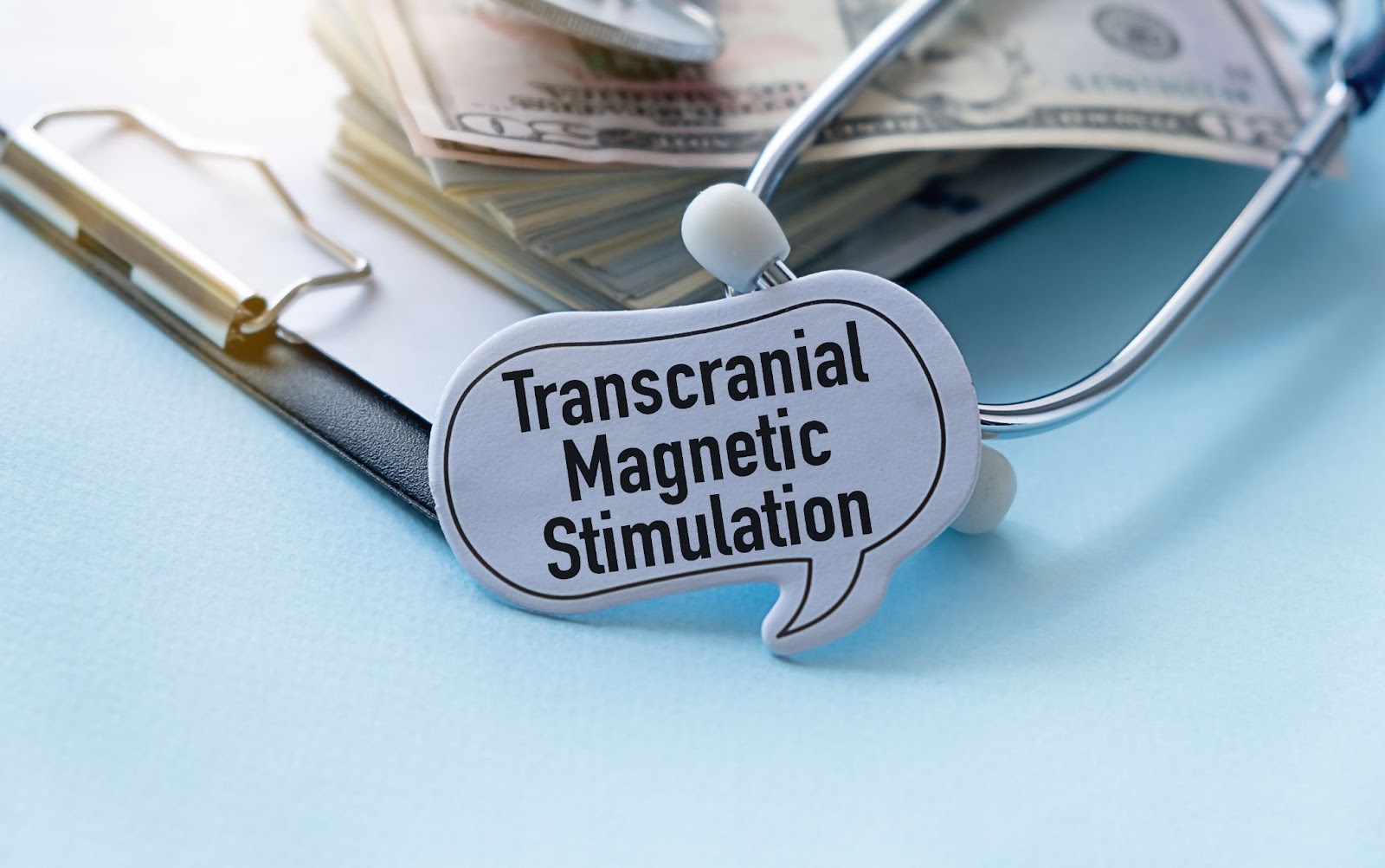Let’s talk about something really important: postpartum depression. It’s way more severe than those typical “baby blues” that many new moms experience. It really throws a wrench into what should be a joyous time. It affects how moms bond with their babies and handle day-to-day life, and honestly, it’s quite tough.
In this guide, we’re diving into how Transcranial Magnetic Stimulation, or TMS, is helping to tackle PPD. It’s pretty groundbreaking and offers hope to those who haven’t had much luck with the usual treatments. We’ll explore how this innovative therapy works, why it might be a game-changer, and what it could mean for new moms struggling with these intense feelings.
Whether you’re going through this yourself, know someone who is, or simply want to understand more about postpartum depression, this guide is meant to provide insights and options. Let’s break down how TMS could help manage PPD and help moms enjoy this special time with their little ones.
Understanding postpartum depression
Postpartum depression (PPD) is a mood disorder that affects some women after childbirth. It goes beyond the commonly termed “baby blues” – which is a brief period of mood swings and anxiety following delivery.
PPD involves more severe and prolonged episodes of depression that may interfere with a mother’s ability to care for her child and handle other daily tasks.
Symptoms of PPD often include deep sadness, feelings of hopelessness, severe anxiety, loss of appetite, sleep disturbances, and sometimes even suicidal ideation.
Risk factors for PPD may include a history of depression, hormonal changes associated with childbirth, the stress of caring for a newborn, and insufficient support systems. Importantly, PPD is a diagnosable and treatable condition with the potential for full recovery.
Women with postpartum depression may experience a broad range of issues that affect their emotional and physical well-being, as well as their capacity for social interaction.
Signs of PPD typically appear within the first few weeks after giving birth, but they also manifest anytime during the first year postpartum. Recognizing and addressing these symptoms early is crucial for effective treatments and recovery.
What is TMS therapy?
Transcranial Magnetic Stimulation (TMS) is a noninvasive medical procedure that uses magnetic fields to stimulate nerve cells in the brain to alleviate depression symptoms. TMS therapy typically targets the prefrontal cortex, an area linked to mood regulation. Pretty cool, right?
During a TMS session, an electromagnetic coil is placed against the scalp near the forehead. This coil then emits short magnetic pulses that pass through the skull and induce small electrical currents, which stimulate nerve cells in the targeted brain region.
TMS therapy is generally considered an option for patients with treatment-resistant depression, meaning that they have not responded to traditional treatment options like antidepressant medication or psychotherapy.
One of the significant benefits of TMS is its minimal side effects, which usually are less severe than those of antidepressants. It is often recommended for individuals who cannot tolerate medication side effects or for whom medication isn’t advisable.
TMS sessions are typically conducted five times a week for four to six weeks. It’s FDA-approved for the treatment of depression and is also studied for other mental health disorders.
The efficacy of TMS in treating postpartum depression
TMS has emerged as a promising option for treating PPD. The efficacy of TMS is reflected in its ability to target the prefrontal cortex – an area often associated with mood regulation that is often underactive in depressive disorders. Research suggests that TMS improves depressive symptoms by stimulating neuronal activity in this region.
Here are some key points on TMS efficacy
- Targeted relief: Magnetic pulses directly influence the brain’s mood centers, offering precise treatment without systemic side effects.
- Improvement in symptoms: Many women with postpartum depression report a significant reduction in common symptoms such as depressed mood, sleep disturbances, and social interaction issues.
- Suitability for treatment-resistant cases: For those with a history of depression or those who don’t respond to antidepressant medication, TMS offers an alternative avenue for relief.
Therapeutic outcomes from TMS are supported by various studies, highlighting it as an effective treatment option, especially for those with treatment-resistant depression. While individual results vary, the non-invasive nature and targeted approach of TMS make it an attractive treatment for postpartum depression.
Benefits of TMS for postpartum depression
TMS presents several advantages when utilized as a treatment option for postpartum depression. Unlike conventional antidepressants, TMS has minimal side effects, making it a suitable alternative for nursing mothers concerned about medication infiltration into breast milk.
TMS uses noninvasive magnetic pulses to specifically target the prefrontal cortex, a brain region closely associated with mood regulation. This precision reduces the risk of unwanted systemic reactions.
Women with postpartum depression often notice improvements in mood, increased capacity for social interaction, and better sleep patterns.
The reduction of symptoms such as depressed mood and suicidal ideation indicates TMS’s potential as an essential tool within the spectrum of effective treatments for depression.
| Benefits of TMS | Description |
| Minimal Side Effects | Fewer systemic side effects compared to medications |
| Targeted Treatment | Focuses on the prefrontal cortex to alleviate mood disorders |
| Efficacy | Addresses depressive symptoms, including treatment-resistant cases |
| Improves Daily Functioning | Enhances mood, sleep, and social interactions without requiring downtime |
This therapy empowers mothers to engage more fully in the formative moments of motherhood without the burdensome cloud of postpartum depression.
Insurance and cost considerations
Navigating the financial aspects of any treatment, including TMS therapy, is important for many patients and their families, especially when you’re adapting to life with a newborn.
Understanding the cost implications and insurance coverage options for TMS therapy helps ease the stress often associated with seeking treatment, especially for conditions like postpartum depression.
When it comes to sorting out the finances for TMS therapy, it can be a bit of a maze, especially with something as specialized as treating postpartum depression. Let’s break it down so you have a clear picture of what to expect and how to manage it.
Cost of TMS therapy
The price tag for TMS varies greatly depending on where you live, which clinic you go to, and the specific treatment plan. Typically, a complete course of TMS might require you to commit to several sessions each week over a few weeks.
Insurance coverage
Luckily, more insurance companies are starting to cover TMS, especially for major depression, but coverage for postpartum depression specifically might still be a grey area. The best move is to call your insurer directly and get the lowdown on what they’ll cover. Make sure to ask:
- Do they cover TMS for postpartum depression?
- Is there a limit on the number of sessions or a cap on how much they’ll pay?
- What kind of documentation do they need to approve the treatment?
Medicaid and Medicare
If you’re on Medicaid or Medicare, coverage for TMS may vary by state and plan. It’s worth making a call to your local office to see what’s covered and what the eligibility criteria are.
Out-of-pocket and financing options
If insurance won’t cover everything or you don’t have coverage, many clinics offer payment plans or scale their fees based on your income. There are also credit lines available specifically for healthcare expenses not covered by insurance, which could be a good option.
Discussing all this upfront will help you navigate the costs associated with TMS so that finances don’t stand in the way of getting the help you need.
Frequently asked questions
What exactly is postpartum depression?
Think of postpartum depression as a significant emotional and mental challenge that hits after having a baby. It’s way more intense than the baby blues, which are pretty common and pass quickly. PPD sticks around and really messes with a new mom’s ability to handle daily life, making it hard to care for herself and the baby.
It’s the last thing any mom wants to deal with while she’s already adjusting to motherhood or transitioning to life with another child.
How does postpartum depression differ from the ‘baby blues’?
Baby blues are like a brief storm of emotions that many new moms experience right after childbirth — think mood swings and weepiness that fade after a couple of weeks. Postpartum depression, though, is like a heavier, longer-lasting storm that really weighs you down and doesn’t go away as quickly or easily.
What does postpartum depression feel like?
Symptoms often include feeling really sad, empty, or hopeless, and sometimes being anxious to the point of panic attacks. There might be trouble bonding with the baby, feeling withdrawn, or even thoughts of harming oneself or the baby. It also often comes with big changes in appetite and sleep.
What causes this to happen?
There’s no single reason why PPD hits, but it’s likely a mix of hormonal changes after childbirth, the sheer exhaustion from delivery, emotional factors like adjusting to motherhood, and often, not having enough support.
Who is more likely to get postpartum depression?
It honestly happens to any new mom, but some things might up the risk, like a past history of depression, a family history of mental health issues, stressful life events, or not feeling supported.
What are the treatment options for postpartum depression?
Treatment typically involves therapy — things like talking it out with a counselor or cognitive-behavioral therapy. Medications also play a role, especially if the depression is severe. Sometimes, joining a support group where other moms share their experiences is really helpful too.
Can postpartum depression affect the baby too?
Yeah, it can. It might make bonding with the baby tougher, which affects the baby’s development and emotional health. However, with the right treatment and support, mothers manage PPD effectively and build strong, healthy relationships with their children.
How can loved ones help a mom dealing with postpartum depression?
Family and friends are super important here. They listen without judging, help out around the house, take care of the baby to give mom a break, and really encourage her to get professional help if things don’t seem to be getting better.
Is TMS therapy safe for nursing mothers?
Yes, TMS therapy is considered safe for nursing mothers. This makes it a suitable option for mothers who are breastfeeding and are concerned about the potential effects of traditional antidepressants.
Can TMS therapy be used as a standalone treatment for PPD?
TMS is an effective standalone treatment for some women with postpartum depression, especially those who prefer not to use medication or have not found medications effective. However, it is also part of a comprehensive treatment plan that includes therapy, counseling, and support groups.
What are the potential side effects of TMS therapy?
TMS therapy is generally well-tolerated. The most common side effects are mild to moderate headache and scalp discomfort during treatment sessions. These symptoms typically improve after the initial sessions as the body adjusts to the treatment. Severe side effects are rare but may include seizures. However, the risk is extremely low.
How do I know if TMS is the right treatment for my postpartum depression?
Deciding on the right treatment involves a thorough evaluation by a healthcare provider specializing in mental health and, ideally, postpartum issues. They will assess your medical history, severity of symptoms, and previous treatment responses.
If you’ve struggled with traditional treatments or are looking for a non-medication-based therapy, TMS might be a suitable option.
What should I expect during a TMS session?
During a TMS session, you will sit in a comfortable chair, and a small, curved device will be positioned over your head. This device generates magnetic pulses that stimulate specific parts of the brain associated with mood regulation. Each session lasts about 30 to 60 minutes, during which you can relax, listen to music, or watch TV.
Can postpartum depression return after successful TMS treatment?
As with other treatments for depression, there is always a possibility that symptoms return. However, many patients experience long-lasting relief after completing a course of TMS therapy. For those who notice symptoms reemerging, additional TMS sessions are scheduled to manage the symptoms effectively.
TMS therapy for postpartum depression at Brain Health Center
If you or someone you know is navigating the challenging waters of postpartum depression, it’s crucial to know that help is available and recovery is possible.
At Brain Health Center, we specialize in innovative treatments like Transcranial Magnetic Stimulation (TMS), which has shown promising results in treating postpartum depression. Our compassionate team is dedicated to providing support and effective care tailored to the unique needs of new mothers.
Don’t let postpartum depression overshadow the joy of motherhood. Reach out to us at Brain Health Center to explore how TMS therapy makse a significant difference. We’re here to help guide you through recovery with the most advanced care options.
Take the first step towards healing by contacting us today. Your well-being is our priority, and together, we will find the path back to enjoying this precious time with your baby.



